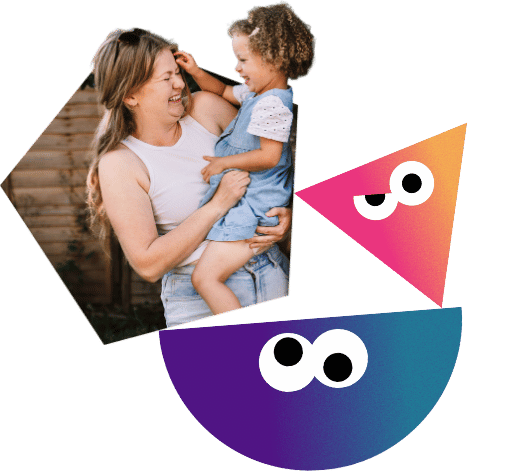Pathway for parents or carers of children aged 6 months to 19+ years
Join our learning pathway for all parents, carers and grandparents: a journey of understanding emotional health, wellbeing, behaviour and much more, for raising confident, kind, emotionally aware and resilient people.
Pathway stages
Bitesize stages for daily steps towards confident parenting and connected relationships.
1. How your child develops
1.1 Welcome!
1.2 How do you currently feel about parenting?
1.3 How parenting makes you feel
1.4 How parenting makes you feel on a bad day
1.5 Finding out more
1.6 Developing your relationship with your child
2. How the brain develops
2.1 How the brain grows
2.2 Video: Experiences build brain architecture
2.3 The developing brain: What it all means
2.4 The importance of early brain development
2.5 Video: Serve and return interaction shapes brain circuitry
2.6 The impact of high levels of stress
2.7 Children’s experiences and the brain
2.8 Brain development through childhood
2.9 Teenage brain development
2.10 A recap
2.11 Time to have a go!
3. Understanding how your child is feeling
3.1 Feeding back on Time to have a go!
3.2 Behaviour is communication!
3.3 How we know we’re happy
3.4 How we know we’re sad
3.6 How we know we’re anxious
3.7 Understanding when your child feels happy
3.8 Understanding when your child feels sad
3.9 Understanding when your child feels tired
3.10 Understanding when your child feels anxious
3.11 Your child’s feelings
4. Reading behaviours
4.1 Reading behaviours
4.2 Other parents’ examples
4.3 Reading your child’s behaviour in these situations
4.4 Look, think, say!
4.5 How our behaviour affects our children
4.6 The challenge of reading behaviours
4.7 Feelings, behaviour and developmental age
4.8 The three key questions
4.9 A recap
4.10 Time to have a go!
5. Tuning into what your child needs
5.1 The story so far…
5.2 Feeding back on Time to have a go!
5.3 Tuning into what your child needs
5.4 A reminder about brain development
5.5 Reflecting on your child’s development
5.6 Helping your child learn new skills: switching shoes
5.7 What it takes to learn new skills
5.8 Switching shoes
5.9 Understanding developmental stages
5.10 A recap
5.11 Time to have a go!
6. Processing feelings
6.1 Developmental stages
6.2 Feeding back on Time to have a go!
6.3 Feeling worse
6.4 Feeling better
6.5 Containment: the basics
6.6 Containment: learning more
6.7 What can happen when we have our own worries
6.8 Making space in your mind
6.9 How feelings are communicated
6.10 The feelings
6.11 Doing things differently
6.12 Thinking about how we say things
6.13 Developing a containing relationship
6.14 Time to have a go!
7. Different styles of parenting
7.1 Reflections so far
7.2 Feeding back on Time to have a go!
7.3 Mid-point recap
7.4 Approaches to parenting
7.5 What you might like to pass on to your children
7.6 Styles of parenting
7.7 Different kinds of parenting
7.8 Authoritative parenting: Getting the balance right
7.9 Time to have a go!
8. Having fun together
8.1 Reflections
8.2 Feeding back on Time to have a go!
8.3 Learning by playing
8.4 How play can benefit relationships
8.5 Different ways of playing
8.6 Another look at the play sequences
8.7 The wider benefits of play
8.8 A recap
8.9 Time to have a go! Part 1
8.10 Time to have a go! Part 2
9. Rhythm of interaction
9.1 Reflections
9.2 Feeding back on Time to have a go!
9.3 Communication between adults
9.4 Understanding the Dance of Reciprocity
9.5 The 7 steps of the Dance
9.6 Understanding babies’ actions
9.7 Noticing the Dance with your children
9.8 The Dance
9.9 Self-regulation and the Dance
9.11 A recap
9.12 Time to have a go!
10. Why is sleep important
10.1 Feeding back on Time to have a go!
10.2 Why do we need to sleep?
10.3 Sleep
10.4 Separating from a child
10.5 Overcoming separation difficulties
10.6 Common causes of sleep disturbance
10.7 What helps us to get to sleep
10.8 Sleeping difficulties
10.9 Having a routine to go to sleep
10.10 Recap
10.11 Time to have a go!
11. Self regulation and anger
11.1 Reflections and what’s coming up
11.2 Feeding back on Time to have a go!
11.3 Anger and independence
11.4 Coping with anger
11.5 Seeing anger in a different way
11.6 When can anger be helpful?
11.7 What are the kinds of things that might make a child feel angry?
11.8 How to help a child who feels angry Part 1
11.9 How to help a child who feels angry Part 2
11.10 Learning emotional containment
11.11 Helping your child learn to manage their anger
11.12 Anger and self-regulation
11.13 Parent child interaction examples
11.14 Alternative approaches you could take
11.15 The marshmallow test
11.16 Recap
11.17 Time to have a go!
12. Communication and tuning in
12.1 Reflections and what’s coming up
12.2 Feeding back on Time to have a go!
12.3 The Dance of Reciprocity: Recap
12.4 How to recover when things go wrong: rupture and repair
12.5 Example of a rupture
12.6 How the situation could be improved: A repair
12.7 Repairing the situation
12.8 Repairing relationships
12.9 What happens after a disagreement
12.10 The importance of apologising
12.11 Helping your child learn rupture and repair
12.12 Time to have a go!
13. Looking back and looking forward
13.1 Reflections and what’s next
13.2 Feeding back on Time to have a go!
13.3 What have you managed to change?
13.4 Quiz Time
13.5 Doing things differently
13.6 Recap of Resources
13.7 Further resources
13.8 Post-course questionnaire
13.9 Solihull acknowledgements
13.10 The end of this course: continuing your journey
About this pathway
The important relationships in your child’s life help shape their emotional health and wellbeing. Along this pathway you will learn about childhood development and emotional processing while being supported to reflect on your own child’s health and wellbeing, their behaviour and your relationship.
Follow short bitesize content with resources that you can tailor to your child’s developmental age. Our clinical child psychologists, psychotherapists and health practitioners will introduce you to ideas and techniques for nurturing wellbeing and you’ll hear about other parent’s experiences. You will also learn about how these ideas can be helpful for common areas of difficulty such as emotional regulation, sleep, toileting and friendships.
Parents who have completed the pathway have shared that they feel more confident about their relationships, are more connected with their children and see improved behaviour as well as a happier home environment.
This online learning pathway covers the same content as our highly rated face-to-face parent group which was proven to make a difference for children’s behaviour and reduce parental stress by a research study completed in 2019. This led to the positive review recognition by the Early intervention Foundation.
90% learners who completed the pathway said that they found it helpful
“I’ve really enjoyed the pathway and it has helped reflect on my own reactions so that I can help my son deal with his own anger better. I have already seen an improvement and I definitely think more before I react to his behaviour.”
Parent from the pathway
“I found the pathway very interesting and it very much helped being able to listen as I’m dyslexic.
Parent from the pathway
“The diagrams really helped as can keep coming back to them and can help my child too by seeing.”
Parent from the pathway
“Using the seven steps of dance has helped me be more in tune with my child.”
Parent from the pathway



